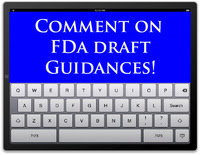


View FDA's Comments on Current Draft Guidance page, for a list of current draft guidances and other topics of interest for patients and caregivers.
|

Statement from FDA Commissioner Robert Califf, M.D. announcing FDA Oncology Center of Excellence launch
The FDA is establishing the Oncology Center of Excellence (OCE) and appointing Dr. Richard Pazdur as its director. This will make oncology the first disease area to have a coordinated clinical review of drugs, biologics, and devices across the agency’s three medical product centers. FDA is taking important steps to formalize the structure and implementation of the OCE as part of its overarching effort to better address the needs of cancer patients, through reorganization within the FDA’s Office of Medical Products and Tobacco. While the review criteria and application requirements for medical products, as well as the work of review staff in the centers will not change, uniting experts to collaborate on the clinical review of oncology products will enhance the agency’s work in approving safe and effective cancer products. In addition, the FDA’s Oncology Center of Excellence will improve the agency’s ability to advance oncology-related regulatory science and policy and streamline stakeholder engagement. |
Final rule enhances protections for research participants, modernizes oversight system
The U.S. Department of Health and Human Services (HHS) and fifteen other Federal Departments and Agencies, including FDA, have announced revisions to modernize, strengthen, and make more effective the Federal Policy for the Protection of Human Subjects that was originally promulgated as a Common Rule in 1991. This final rule is intended to better protect human subjects involved in research, while facilitating valuable research and reducing burden, delay, and ambiguity for investigators. These revisions are an effort to modernize, simplify, and enhance the current system of oversight. The final rule can be accessed in the Federal Register. More information
The U.S. Department of Health and Human Services (HHS) and fifteen other Federal Departments and Agencies, including FDA, have announced revisions to modernize, strengthen, and make more effective the Federal Policy for the Protection of Human Subjects that was originally promulgated as a Common Rule in 1991. This final rule is intended to better protect human subjects involved in research, while facilitating valuable research and reducing burden, delay, and ambiguity for investigators. These revisions are an effort to modernize, simplify, and enhance the current system of oversight. The final rule can be accessed in the Federal Register. More information

Working Together to Reduce the Devastating Effects of Opioid Misuse, by Robert M. Califf, M.D., Past Commissioner of the U.S. Food and Drug Administration
The public health crisis of opioid misuse, addiction and overdose is one of the most challenging issues the U.S. Food and Drug Administration has faced during my time as FDA commissioner. Solving this issue is critical to our future. The issues cut across every socioeconomic level and geographic boundary. It would be difficult to identify any community in America that has not been touched by friends, family members or colleagues suffering from addiction, and far too often, losing their lives to it. As I leave the agency as part of the presidential transition, I have reflected on what I have seen, how far the nation has come, and the important work that remains for both the public and private sectors.
To read the rest of this post, see FDA Voice Blog, January 19, 2017.
FDA Advisory Committees: Independent, Informed, Essential, and Evolving, by Robert M. Califf, M.D., Past Commissioner of the U.S. Food and Drug AdministrationOne of the most common concerns raised when I meet with medical leaders is the need to improve the function of FDA’s Advisory Committees (ACs). ACs play a key role in FDA’s decision-making process by providing independent expert advice on extraordinarily complex issues. Just as importantly, they offer a forum for open and transparent discussion about these processes. As their name suggests, ACs are only advisory, but they can yield unique insights into understanding the balance of benefits and risks of products. Not every product is brought to an advisory committee — when the answers are clear, the FDA makes decisions without consulting an AC. But when products present challenging issues or involve developing areas of science, the views of experts in relevant fields can provide essential perspective needed to make good decisions.
To read the rest of this post, see FDA Voice Blog, January 18, 2017.
|























.png)











No hay comentarios:
Publicar un comentario